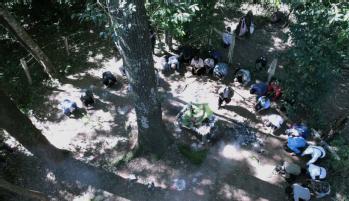Research from the University of Warwick has found that national parks and protected areas are at a higher risk of forest fires when located farther away from indigenous communities.
Based on the analysis of satellite images from Thailand and case studies from other Southeast Asian countries, the research demonstrates that policymakers can achieve improvements in forest health by working collaboratively with indigenous communities. Involving communities results in reduction of forest fires and air pollution.
Ivo Vlaev, Professor of Behavioural Science at Warwick Business School at the University of Warwick says that current green policies in Thailand do not take into account that indigenous communities have long-standing traditions and sustainable practices for protecting the land.
"Globally, Indigenous peoples' lands cover over 36% of intact forest landscapes, making them crucial for mitigating severe climate change. We also know that the loss of intact forest landscapes has been significantly lower on indigenous lands compared to other areas.
"Current green policies exclude local communities from using the forest and at the same time prevents them from implementing effective environmental management practices, such as community forestry, tree ordination – a symbolic Buddhist ritual which involves wrapping orange robes to help people view them as sacred and therefore prevent logging and deforestation -, forest fire monitoring, and animal grazing - all of which have been proven to protect forest cover."
 The Mae Sa Noi village in the Chiang Mai highlands in Thailand is home to a Hmong community. The villagers have successfully instilled ancient Hmong rituals which involve annual celebrations for a deity believed to be inhabiting the sacred tong seng tree in the forest.
The Mae Sa Noi village in the Chiang Mai highlands in Thailand is home to a Hmong community. The villagers have successfully instilled ancient Hmong rituals which involve annual celebrations for a deity believed to be inhabiting the sacred tong seng tree in the forest.
Co-author of the research, Dr Marco J Haenssgen from Chiang Mai University, Thailand is in close contact with the community through his work. He says: "The purpose of these celebrations is to strengthen the protection of the forest while also showcasing the community's commitment to the natural environment to the local authorities who are also invited to these events."
The Hmong community has experienced competition for natural resources after the state promoted rural development initiatives in order to diversify agriculture away from opium production in the 1960s. Subsequently, stringent forest protection enforcement led to arrests and fines throughout the 1980s and 1990s.
"After experiencing these conditions for many years, the community is facing widespread outmigration of young people, volatility of agricultural markets, and even challenges around food security," continues Dr Haenssgen.
Thai conservation law currently stands in contrast to the global policy direction that aims to support indigenous livelihoods and preserve terrestrial areas. Some policies meant to prevent deforestation actually have the opposite effect by displacing indigenous people and pushing them into more intensive land use, such as cash-cropping which sees continuous cultivation of crops using harmful chemical fertilisers.
"Policymakers need to recognise the value strong communities play in healthy environments and communities need space and the right to thrive sustainably," says Professor Vlaev.
"It's not just about giving indigenous people a fair share of the economy, it is about implementing green policies which are actually effective. Several countries have successfully worked with indigenous communities to develop inclusive conservation policies."
Countries such as Indonesia, New Zealand, Philippines, Norway and Malaysia have involved communities in policy decision-making and achieved sustainable outcomes while respecting indigenous rights.
Recommendations for inclusive forest conservation policies
Academics say Thailand can learn lessons from the experiences of other countries and set out a series of practical recommendations to develop effective sustainable policies and enhance forest conservation:
- Implement flexible laws and regulations that consider the specific needs and aspirations of Indigenous communities. The Royal Forestry Department holds the responsibility to create designated zones where Indigenous peoples have the right to manage and utilize forest resources following their traditional practices. This area may extend further into national park territory than presently. Providing a legal framework for Indigenous communities to assert their rights over ancestral lands and resources can also contribute to sustainable forest management.
- Establish collaborative arrangements involving local communities to co-care for forest land. Involving indigenous communities in forest fire prevention, waste collection, and other activities will enhance their sense of ownership and motivation to protect and conserve the forest.
- Ensure land protection rights and secure tenure for Indigenous communities. The Ministry of Interior and the Ministry of Social Development and Human Security play key roles in strengthening measures to safeguard these rights and address land conflicts. Additionally, establishing social insurance schemes and promoting welfare benefits can improve the social and economic well-being of Indigenous communities, reducing pressure on agricultural production.
- Thailand can encourage consumers to support highland communities by labelling products sourced from them, produced under culturally protected and sustainable indigenous practices. The Thai Food and Drug Administration ensures compliance with Good Manufacturing Practices, supporting sustainable production methods and quality. The Royal Project Foundation, a major agricultural-environmental development organization, can also support food labelling as a market-based initiative. "No-burn" labels can be used to signify that this agriculturist has not practiced crop burning that is responsible for air pollution.
- Thailand should streamline and expedite the process of issuing land titles to recognize their customary land rights, to join the rest of the world in recognising the capabilities of Indigenous people.
- The Ministries of Culture, Interior, Social development and Human Development have a central role in promoting cultural diversity and enforcing Indigenous cultural freedom, thereby helping Thailand expand the special cultural zones that provide legal protection and recognition for Indigenous cultures and traditions. These zones should be designed to preserve and promote Indigenous languages, knowledge systems, and cultural practices, yet with a focus on everyday heritage rather than locking communities into "traditions" that are bound to evolve.






